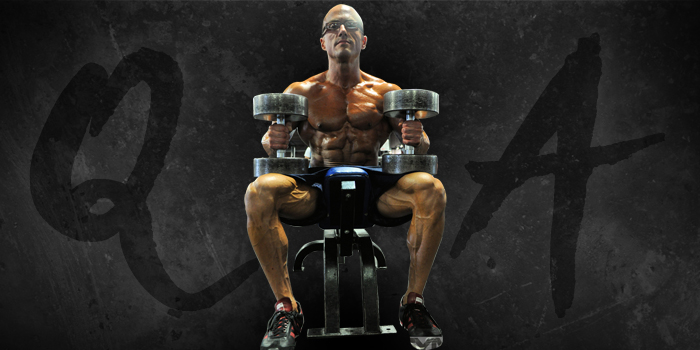
IFBB Pro and famed bodybuilding coach Shelby Starnes is known for his ability to drastically change the bodies of his clients. An elitefts alumni, Starnes has authored six ebooks and helped hundreds of competitors reach their physique goals. In addition to both the services he provides and his own bodybuilding success (earning his pro status in 2012), Starnes is an expert at concisely answering questions about training and nutrition.
In this collection of Q&As, Shelby answers questions about the use of stimulants, how high you should let your weight escalate before a diet, and how to use cheat meals.
 Client Tiffany Laumeyer
Client Tiffany Laumeyer
QUESTION
I love stimulants but if I take any caffeine after 3 PM I'm counting sheep till the wee hours of the night. What else can I use?
ANSWER
It seems like half the people in the world are either extremely insensitive to caffeine (can down a quadruple-espresso and fall right asleep) while the other half are the exact opposite; a cup of coffee at lunch time will keep them up until 4 in the morning.
RECENT: Shelby Starnes Q&A: Insulin Resistance, Contest Prep, Keto, and Blowing Your Diet
For those in the latter category, I would suggest a non-stimulant fat burner or energy/focus supplement such as:
• L-tyrosine. Tyrosine is a very cool amino acid that is especially helpful during times of stress and fatigue (such as a diet). It is a precursor to neurotransmitter production, and is also linked to norepinephrine and epinephrine (adrenalin) production. L-tyrosine is also linked to thyroid production and supplementing with it can help correct hypothyroidism. Suggested dosing: 500-1,000mg, one to three times per day (pre-cardio and pre-workout).
• Acetyl l-carnitine (ALCAR). ALCAR is an acetylated form of l-carnitine. Like l-carnitine, it is involved in the metabolism of energy (from food), and helps transport fat throught the cell membrane into the mitochondria, where it is used as fuel. ALCAR’s acetyl group helps support the production of acetylcholine, an important neurotransmitter in both the peripheral and central nervous systems. It also stimulates the release of dopamine, a neurotransmitter commonly associated with the “pleasure”, “reward,” and “motivation” centers of the brain. Suggested dosing: 500-1,500mg, one to three times per day (pre-cardio and pre-workout).
• Green Tea Extract. Aside from it's many health benefits (including being an excellent antioxidant as well as anti-carcinogen), green tea has a host of powerful effects that make it very helpful for dieting, including burning fat directly (via beta oxidation), increasing metabolism, and improving insulin sensitivity and glucose tolerance. Green tea is also in a class of natural substances known as adaptogens, known for their ability to help the body combat stress and fatigue, as well as maintain homeostasis and well-being. Suggested dosing: The “magic” of green tea is mainly due to its high levels of catechin polyphenols, namely epigallocatechin gallate (EGCG). Different extracts contain different percentages of EGCG, so read labels carefully. For dosing purposes, I recommend getting 200-400mg of EGCG, one to three times per day (pre-cardio and pre-workout especially). Drinking green tea is another way to obtain its benefits, and also serves as an excellent appetite suppressant. A cup of hot green tea in between meals is a great way to keep hunger at bay.
 Client Matt Kouba
Client Matt Kouba
QUESTION
How big should I allow myself to get before starting a diet?
ANSWER
Do you mean how fat? Fat doesn’t build muscle, brotato. BUT it's hard to grow without a caloric surplus, and since it’s difficult to pinpoint the exact amount needed to be in an “optimal surplus,” many will overshoot things a bit and end up getting a bit smoother in the process.
Gaining a little fat is better than the alternative — not eating enough to support muscle gains. As for “how big” you should allow yourself to get, that will depend on a number of factors including your individual metabolism (people with faster metabolisms can get away with pushing the calories a little higher, while people with slower metabolisms need to reign things in a bit), your time line (when are you competing next? Four months from now, or 18 months? Obviously a shorter time line will require you to not get too out of shape), and whether you’re enhanced or not (natural guys should stay a bit leaner, not only because they don’t have the pharmaceutical arsenal for fat loss that enhanced competitors do— think GH, t3, clenbuterol, etc.—but also because they don’t have the hormonal support to minimize catabolism—think testosterone and other anabolics).
Bottom line is it’s very individual, and also depends a bit on personal preference. Some people just don’t like to get too big and bloated in the offseason, while others think it’s the greatest thing in the world. Find your own personal preference that allows you to make consistent gains, but also stay sane and healthy in the process.
 Client Heather Grace
Client Heather Grace
QUESTION
Hey Shelby, bottom line: Cheat meals — how do I know if they’re something that could help my diet? I keep reading that they up-regulate leptin or something, but I’m not sure if my leptin is low to begin with! Are they three steps forward, two steps back?
ANSWER
Whether or not a cheat meal (or a high-carb “refeed”) is warranted is based on a variety of factors, including an individual’s metabolism, body fat level, how long they’ve been dieting, how far out from their show they are (if competing), etc.
Utilized properly, and under the right circumstances, they are a great way to stimulate metabolism, refuel glycogen stores, and give some mental relief. All too often though I see guys (and gals) giving themselves a cheat meal because they “think they deserve it” (maybe they completed eight hours of dieting successfully, or something equally unimpressive). This is obviously a case of a cheat meal being misapplied.
Some signs to look for to indicate a cheat meal or refeed is warranted:
- Fat loss has plateaued
- Weight has dropped significantly in just a few days (indicating too much glycogen and water loss)
- Body temperature is lower than normal (you feel cold all the time)
- You feel like complete shit
They serve a psychological benefit as well, but they shouldn’t be employed when:
- You’re bored with your diet
- Gee, that looks good
- You hear the ice cream truck
Don’t feel guilty if you really do need to take a cheat meal or refeed; they won’t set you back at all. In fact, NOT taking one when one is needed is what can you set yourself back. It’s not always about who can diet the hardest; it’s about who can diet the smartest.
Header image via Jeffrey Sygo at www.symiphotography.com









